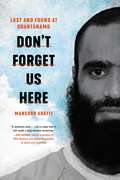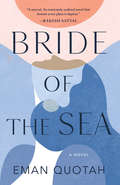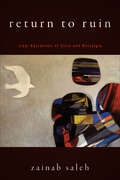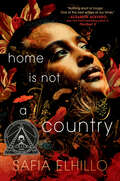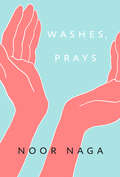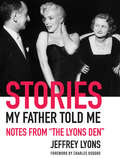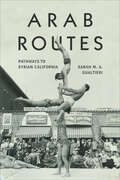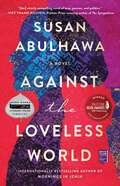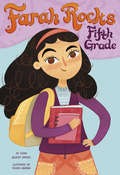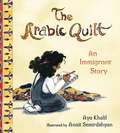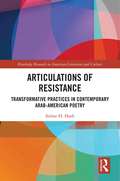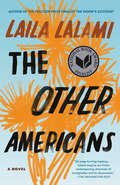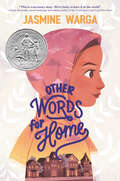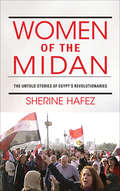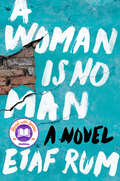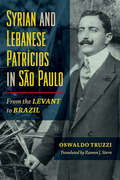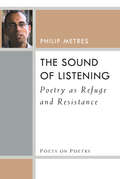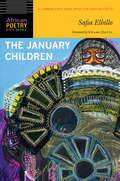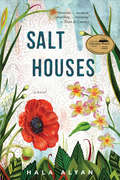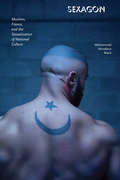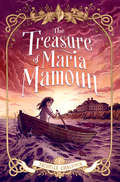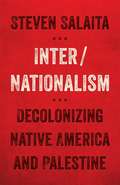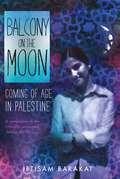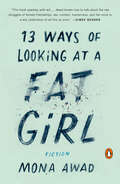Special Collections
Arab American Book Award
- Table View
- List View
Don't Forget Us Here
by Mansoor AdayfiThis moving, eye-opening memoir of an innocent man detained at Guantánamo Bay for fifteen years tells a story of humanity in the unlikeliest of places and an unprecedented look at life at Guantánamo.At the age of 18, Mansoor Adayfi left his home in Yemen for a cultural mission to Afghanistan. He never returned. Kidnapped by warlords and then sold to the US after 9/11, he was disappeared to Guantánamo Bay, where he spent the next 15 years as Detainee #441.Don't Forget Us Here tells two coming-of-age stories in parallel: a makeshift island outpost becoming the world's most notorious prison and an innocent young man emerging from its darkness. Arriving as a stubborn teenager, Mansoor survived the camp's infamous interrogation program and became a feared and hardened resistance fighter leading prison riots and hunger strikes. With time though, he grew into the man prisoners nicknamed "Smiley Troublemaker": a student, writer, and historian. With unexpected warmth and empathy, he unwinds a narrative of fighting for hope and survival in unimaginable circumstances, illuminating the limitlessness of the human spirit. And through his own story, Mansoor also tells Guantánamo's story, offering an unprecedented window into one of the most secretive places on earth and the people—detainees and guards alike—who lived there with him. Twenty years later, Guantánamo remains open, and at a moment of due reckoning, Mansoor Adayfi helps us understand what actually happened there—both the horror and the beauty—a vital chronicle of an experience we cannot afford to forget.
Bride of the Sea
by Eman Quotah“A marvel. An intricately realized novel that honors every place it depicts.” —Rakesh Satyal “I love the sea,” she said. “I don’t know if I could live without it.” During a snowy Cleveland February, newlywed university students Muneer and Saeedah are expecting their first child, and he is harboring a secret: the word divorce is whispering in his ear. Soon, their marriage will end, and Muneer will return to Saudi Arabia, while Saeedah remains in Cleveland with their daughter, Hanadi. Consumed by a growing fear of losing her daughter, Saeedah disappears with the little girl, leaving Muneer to desperately search for his daughter for years. The repercussions of the abduction ripple outward, not only changing the lives of Hanadi and her parents, but also their interwoven family and friends—those who must choose sides and hide their own deeply guarded secrets. And when Hanadi comes of age, she finds herself at the center of this conflict, torn between the world she grew up in and a family across the ocean. How can she exist between parents, between countries? Eman Quotah’s Bride of the Sea is a spellbinding debut of colliding cultures, immigration, religion, and family; an intimate portrait of loss and healing; and, ultimately, a testament to the ways we find ourselves inside love, distance, and heartbreak.
Return to Ruin
by Zainab SalehWith the U.S. invasion of Iraq, Iraqis abroad, hoping to return one day to a better Iraq, became uncertain exiles. Return to Ruin tells the human story of this exile in the context of decades of U.S. imperial interests in Iraq—from the U.S. backing of the 1963 Ba'th coup and support of Saddam Hussein's regime in the 1980s, to the 1991 Gulf War and 2003 invasion and occupation. Zainab Saleh shares the experiences of Iraqis she met over fourteen years of fieldwork in Iraqi London—offering stories from an aging communist nostalgic for the streets she marched since childhood, a devout Shi'i dreaming of holy cities and family graves, and newly uprooted immigrants with fresh memories of loss, as well as her own. Focusing on debates among Iraqi exiles about what it means to be an Iraqi after years of displacement, Saleh weaves a narrative that draws attention to a once-dominant, vibrant Iraqi cultural landscape and social and political shifts among the diaspora after decades of authoritarianism, war, and occupation in Iraq. Through it all, this book illuminates how Iraqis continue to fashion a sense of belonging and imagine a future, built on the shards of these shattered memories.
Home Is Not a Country
by Safia ElhilloA mesmerizing novel in verse about family, identity, and finding yourself in the most unexpected places--for fans of The Poet X, I Am Not Your Perfect Mexican Daughter, and Jason Reynolds.
Nima doesn't feel understood. By her mother, who grew up far away in a different land. By her suburban town, which makes her feel too much like an outsider to fit in and not enough like an outsider to feel like that she belongs somewhere else. At least she has her childhood friend Haitham, with whom she can let her guard down and be herself. Until she doesn't.
As the ground is pulled out from under her, Nima must grapple with the phantom of a life not chosen, the name her parents didn't give her at birth: Yasmeen. But that other name, that other girl, might just be more real than Nima knows. And more hungry. And the life Nima has, the one she keeps wishing were someone else's. . .she might have to fight for it with a fierceness she never knew she had."
Nothing short of magic...One of the best writers of our times."-- Elizabeth Acevedo, New York Times Bestselling author of The Poet X
Washes, Prays
by Noor NagaRBC Bronwen Wallace Award winner Noor Naga's bracing debut, a novel-in-verse about a young woman's romantic relationship with a married man and her ensuing crisis of faith.2021 Arab American Book Award - George Ellenbogen Poetry Award, WinnerPat Lowther Memorial Award, WinnerGerald Lampert Memorial Award, LonglistFred Cogswell Award For Excellence In Poetry, Second Place WinnerCBC Best Canadian Poetry of 2020Coocoo is a young immigrant woman in Toronto. Her faith is worn threadbare after years of bargaining with God to end her loneliness and receiving no answer. Then she meets her mirror-image; Muhammad is a professor and father of two. He's also married. Heartbreaking and hilarious, this verse-novel chronicles Coocoo's spiraling descent: the transformation of her love into something at first desperate and obsessive, then finally cringing and animal, utterly without grace. Her best friend, Nouf, remains by her side throughout, and together they face the growing contradictions of Coocoo's life. What does it mean to pray while giving your body to a man who cannot keep it? How long can a homeless love survive on the streets? These are some of the questions this verse-novel swishes around in its mouth.
Stories My Father Told Me
by Charles Osgood and Jeffrey LyonsThis amazing collection of choice anecdotes takes us right back to the Golden Age of New York City nightlife, when top restaurants like Toots Shor's, "21," and Sardi's, as well as glittering nightclubs like the Stork Club, Latin Quarter, and El Morocco, were the nightly gathering spots for great figures of that era: movie and Broadway stars, baseball players, champion boxers, comedians, diplomats, British royalty, prize-winning authors, and famous painters. From Charlie Chaplin to Winston Churchill, from Ethel Barrymore to Sophia Loren, from George Burns to Ernest Hemingway, from Joe DiMaggio to the Duke of Windsor: Leonard Lyons knew them all. For forty glorious years, from 1934 to 1974, he made the daily rounds of Gotham nightspots, collecting the exclusive scoops and revelations that were at the core of his famous newspaper column, "The Lyons Den."In this entertaining volume Jeffrey Lyons has assembled a considerable compilation of anecdotes from his father's best columns, and has also contributed a selection of his own interviews with stars of today, including Penélope Cruz and George Clooney, among others. Organized chronologically by decade and subdivided by celebrity, Stories My Father Told Me offers fascinating, amusing stories that are illustrated by approximately seventy photographs. He so captured the tenor of those exciting times that the great Lincoln biographer Carl Sandburg said: "Imagine how much richer American history would have been had there been a Leonard Lyons in Lincoln's time."
Arab Routes
by Sarah GualtieriLos Angeles is home to the largest population of people of Middle Eastern origin and descent in the United States. Since the late nineteenth century, Syrian and Lebanese migration, in particular, to Southern California has been intimately connected to and through Latin America. Arab Routes uncovers the stories of this Syrian American community, one both Arabized and Latinized, to reveal important cross-border and multiethnic solidarities in Syrian California. Sarah M. A. Gualtieri reconstructs the early Syrian connections through California, Texas, Mexico, and Lebanon. She reveals the Syrian interests in the defense of the Mexican American teens charged in the 1942 Sleepy Lagoon murder, in actor Danny Thomas's rise to prominence in LA's Syrian cultural festivals, and in more recent activities of the grandchildren of immigrants to reclaim a sense of Arabness. Gualtieri reinscribes Syrians into Southern California history through her examination of powerful images and texts, augmented with interviews with descendants of immigrants. Telling the story of how Syrians helped forge a global Los Angeles, Arab Routes counters a long-held stereotype of Arabs as outsiders and underscores their longstanding place in American culture and in interethnic coalitions, past and present.
Against the Loveless World
by Susan AbulhawaFrom the internationally bestselling author of the “terrifically affecting” (The Philadelphia Inquirer) Mornings in Jenin, a sweeping and lyrical novel that follows a young Palestinian refugee as she slowly becomes radicalized while searching for a better life for her family throughout the Middle East. For readers of international literary bestsellers including Washington Black, My Sister, The Serial Killer, and Her Body and Other Parties.
As Nahr sits, locked away in solitary confinement, she spends her days reflecting on the dramatic events that landed her in prison in a country she barely knows. Born in Kuwait in the 70s to Palestinian refugees, she dreamed of falling in love with the perfect man, raising children, and possibly opening her own beauty salon. Instead, the man she thinks she loves jilts her after a brief marriage, her family teeters on the brink of poverty, she’s forced to prostitute herself, and the US invasion of Iraq makes her a refugee, as her parents had been. After trekking through another temporary home in Jordan, she lands in Palestine, where she finally makes a home, falls in love, and her destiny unfolds under Israeli occupation.
Nahr’s subversive humor and moral ambiguity will resonate with fans of My Sister, The Serial Killer, and her dark, contemporary struggle places her as the perfect sister to Carmen Maria Machado’s Her Body and Other Parties. Written with Susan Abulhawa’s distinctive “richly detailed, beautiful, and resonant” (Publishers Weekly) prose, this powerful novel presents a searing, darkly funny, and wholly unique portrait of a Palestinian woman who refuses to be a victim.
Farah Rocks Fifth Grade
by Susan Muaddi DarrajFarah and her best friend, Allie Liu, are getting excited to turn in their applications to the Magnet Academy, where they both hope to attend sixth grade. But when new girl Dana Denver shows up, Farah's world is turned upside down. As Dana starts bullying Farah's little brother, Samir, Farah begins to second-guess her choice to leave him behind at Harbortown Elementary/Middle School. Determined to handle it on her own, Farah comes up with a plan--a plan that involves lying to those closest to her. Will her lies catch up with her, or can Farah find a way to defeat the bully and rock fifth grade?
The Arabic Quilt
by Aya KhalilKanzi’s family has moved from Egypt to America, and on her first day in a new school, what she wants more than anything is to fit in. Maybe that’s why she forgets to take the kofta sandwich her mother has made for her lunch, but that backfires when Mama shows up at school with the sandwich. Mama wears a hijab and calls her daughter Habibti (dear one). When she leaves, the teasing starts. That night, Kanzi wraps herself in the beautiful Arabic quilt her teita (grandma) in Cairo gave her and writes a poem in Arabic about the quilt. Next day her teacher sees the poem and gets the entire class excited about creating a “quilt” (a paper collage) of student names in Arabic. In the end, Kanzi’s most treasured reminder of her old home provides a pathway for acceptance in her new one. This authentic story with beautiful illustrations includes a glossary of Arabic words and a presentation of Arabic letters with their phonetic English equivalents.
Articulations of Resistance
by Sirene HarbUsing a theoretical framework located at the intersection of US ethnic studies, transnational studies, and postcolonial studies, Articulations of Resistance: Transformative Practices in Arab-American Poetry maps an interdisciplinary model of critical inquiry to demonstrate the intimate link and multilayered connections between poetry and resistance. In this study of contemporary Arab-American poetry, Sirène Harb analyzes how resistance, defined as the force challenging the dominant, intervenes in ways of rethinking the local and the global vis-à-vis traditional paradigms of time, space, language and value.
The Other Americans
by Laila LalamiFrom the Pulitzer Prize finalist and author of The Moor’s Account, here is a timely and powerful novel about the suspicious death of a Moroccan immigrant—at once a family saga, a murder mystery, and a love story, informed by the treacherous fault lines of American culture. Late one spring night, Driss Guerraoui, a Moroccan immigrant living in California, is walking across a darkened intersection when he is killed by a speeding car. The repercussions of his death bring together a diverse cast of characters: Guerraoui’s daughter Nora, a jazz composer who returns to the small town in the Mojave she thought she'd left for good; his widow, Maryam, who still pines after her life in the old country; Efraín, an undocumented witness whose fear of deportation prevents him from coming forward; Jeremy, an old friend of Nora's and an Iraq War veteran; Coleman, a detective who is slowly discovering her son's secrets; Anderson, a neighbor trying to reconnect with his family; and the murdered man himself. As the characters—deeply divided by race, religion, and class—tell their stories, connections among them emerge, even as Driss’s family confronts its secrets, a town faces its hypocrisies, and love, messy and unpredictable, is born.
Other Words for Home
by Jasmine WargaA gorgeously written, hopeful middle grade novel in verse about a young girl who must leave Syria to move to the United States, perfect for fans of Jason Reynolds and Aisha Saeed.
Jude never thought she’d be leaving her beloved older brother and father behind, all the way across the ocean in Syria.
But when things in her hometown start becoming volatile, Jude and her mother are sent to live in Cincinnati with relatives.
At first, everything in America seems too fast and too loud. The American movies that Jude has always loved haven’t quite prepared her for starting school in the US—and her new label of “Middle Eastern,” an identity she’s never known before.
But this life also brings unexpected surprises—there are new friends, a whole new family, and a school musical that Jude might just try out for. Maybe America, too, is a place where Jude can be seen as she really is.
This lyrical, life-affirming story is about losing and finding home and, most importantly, finding yourself.
A New York Times Bestseller
Women of the Midan
by Sherine HafezAn exploration of gender, the Arab Spring, and women&’s experiences of revolution, including firsthand accounts. In Women of the Midan, Sherine Hafez demonstrates how women were a central part of revolutionary process of the Arab Spring. Women not only protested in the streets of Cairo, they demanded democracy, social justice, and renegotiation of a variety of sociocultural structures. Women&’s resistance to state control, Islamism, neoliberal market changes, the military establishment, and patriarchal systems forged new paths of dissent and transformation. Through firsthand accounts of women who participated in the revolution, Hafez illustrates how the gendered body signifies collective action and the revolutionary narrative. Using the concept of rememory, Hafez shows how the body is inseparably linked to the trauma of the revolutionary struggle. While delving into the complex weave of public space, government control, masculinity, and religious and cultural norms, Hafez sheds light on women&’s relationship to the state in the Arab world today and how the state, in turn, shapes individuals and marks gendered bodies.
A Woman Is No Man
by Etaf RumA Goodreads Choice Awards Finalist for Best Fiction and Best Debut • BookBrowse's Best Book of the Year • A Marie Claire Best Women's Fiction of the Year • A Real Simple Best Book of the Year • A PopSugar Best Book of the Year • A New York Times Book Review Editors’ Choice • A Washington Post 10 Books to Read in March • A Newsweek Best Book of the Summer • A USA Today Best Book of the Week • A Washington Book Review Difficult-To-Put-Down Novel • A Refinery 29 Best Books of the Month • A Buzzfeed News 4 Books We Couldn't Put Down Last Month • A New Arab Best Books by Arab Authors • An Electric Lit 20 Best Debuts of the First Half of 2019 • A The Millions Most Anticipated Books of the Year“Garnering justified comparisons to Khaled Hosseini’s A Thousand Splendid Suns... Etaf Rum’s debut novel is a must-read about women mustering up the bravery to follow their inner voice.” —Refinery 29The New York Times bestseller and Read with Jenna TODAY SHOW Book Club pick telling the story of three generations of Palestinian-American women struggling to express their individual desires within the confines of their Arab culture in the wake of shocking intimate violence in their community."Where I come from, we’ve learned to silence ourselves. We’ve been taught that silence will save us. Where I come from, we keep these stories to ourselves. To tell them to the outside world is unheard of—dangerous, the ultimate shame.”Palestine, 1990. Seventeen-year-old Isra prefers reading books to entertaining the suitors her father has chosen for her. Over the course of a week, the naïve and dreamy girl finds herself quickly betrothed and married, and is soon living in Brooklyn. There Isra struggles to adapt to the expectations of her oppressive mother-in-law Fareeda and strange new husband Adam, a pressure that intensifies as she begins to have children—four daughters instead of the sons Fareeda tells Isra she must bear.Brooklyn, 2008. Eighteen-year-old Deya, Isra’s oldest daughter, must meet with potential husbands at her grandmother Fareeda’s insistence, though her only desire is to go to college. Deya can’t help but wonder if her options would have been different had her parents survived the car crash that killed them when Deya was only eight. But her grandmother is firm on the matter: the only way to secure a worthy future for Deya is through marriage to the right man.But fate has a will of its own, and soon Deya will find herself on an unexpected path that leads her to shocking truths about her family—knowledge that will force her to question everything she thought she knew about her parents, the past, and her own future.
Syrian and Lebanese Patricios in Sao Paulo
by Oswaldo TruzziSyrian and Lebanese immigrants to Brazil chose to settle in urban areas, a marked contrast to many other migrant groups. In São Paulo, these newcomers embraced new lives as merchants, shopkeepers, and industrialists that made them a dominant force in the city's business sector. Oswaldo Truzzi's original work on these so-called patrícios changed the face of Brazilian studies. Now available in an English translation, Truzzi's pioneering book identifies the complex social paths blazed by Syrian and Lebanese immigrants and their descendants from the 1890s to the 1960s. He considers their relationships to other groups within São Paulo's kaleidoscopic mix of cultures. He also reveals the differences--real and perceived--between Syrians and Lebanese in terms of religious and ethnic affinities and in the economic sphere. Finally, he compares the two groups with their counterparts in the United States and looks at the wave of Lebanese Muslims to São Paulo that began in the 1960s.
The Sound of Listening
by Philip MetresPhilip Metres stakes a claim for the cultural work that poems can perform—from providing refuge to embodying resistance, from recovering silenced voices to building a more just world, in communities of solitude and solidarity. Gathering a decade of his writing on poetry, he widens our sense of poetry as a way of being in the world, proposing that poems can offer a permeability to marginalized voices and a shelter from the imperial noise and despair that can silence us. The Sound of Listening ranges between expansive surveys of the poetry of 9/11, Arab American poetry, documentary poetry, landscape poetry, installation poetry, and peace poetry; personal explorations of poets such as Adrienne Rich, Khalil Gibran, Lev Rubinstein, and Arseny Tarkovsky; and intimate dialogues with Randa Jarrar, Fady Joudah, and Micah Cavaleri, that illuminate Metres’s practice of listening in his 2015 work, Sand Opera.
Mirage
by Somaiya DaudThis “enriching, thrilling, and captivating” (BuzzFeed) Moroccan-inspired debut “has what it takes to be the next big thing in sci-fi/fantasy” (SLJ, starred review)!In a world dominated by the brutal Vathek empire, eighteen-year-old Amani is a dreamer. She dreams of what life was like before the occupation; she dreams of writing poetry like the old-world poems she adores; she dreams of receiving a sign from Dihya that one day, she, too, will have adventure, and travel beyond her isolated home.But when adventure comes for Amani, it is not what she expects: she is kidnapped by the regime and taken in secret to the royal palace, where she discovers that she is nearly identical to the cruel half-Vathek Princess Maram. The princess is so hated by her conquered people that she requires a body double, someone to appear in public as Maram, ready to die in her place.As Amani is forced into her new role, she can’t help but enjoy the palace’s beauty—and her time with the princess’ fiancé, Idris. But the glitter of the royal court belies a world of violence and fear. If Amani ever wishes to see her family again, she must play the princess to perfection...because one wrong move could lead to her death.
The January Children
by Kwame Dawes and Safia ElhilloIn her dedication Safia Elhillo writes, “The January Children are the generation born in Sudan under British occupation, where children were assigned birth years by height, all given the birth date January 1.”
What follows is a deeply personal collection of poems that describe the experience of navigating the postcolonial world as a stranger in one’s own land.
The January Children depicts displacement and longing while also questioning accepted truths about geography, history, nationhood, and home. The poems mythologize family histories until they break open, using them to explore aspects of Sudan’s history of colonial occupation, dictatorship, and diaspora.
Several of the poems speak to the late Egyptian singer Abdelhalim Hafez, who addressed many of his songs to the asmarani—an Arabic term of endearment for a brown-skinned or dark-skinned person. Elhillo explores Arabness and Africanness and the tensions generated by a hyphenated identity in those two worlds. No longer content to accept manmade borders, Elhillo navigates a new and reimagined world.
Maintaining a sense of wonder in multiple landscapes and mindscapes of perpetually shifting values, she leads the reader through a postcolonial narrative that is equally terrifying and tender, melancholy and defiant.
Salt Houses
by Hala AlyanOn the eve of her daughter Alia’s wedding, Salma reads the girl’s future in a cup of coffee dregs. She sees an unsettled life for Alia and her children; she also sees travel, and luck. While she chooses to keep her predictions to herself that day, they will all soon come to pass when the family is uprooted in the wake of the Six-Day War of 1967.
Salma is forced to leave her home in Nablus; Alia’s brother gets pulled into a politically militarized world he can’t escape; and Alia and her gentle-spirited husband move to Kuwait City, where they reluctantly build a life with their three children.
When Saddam Hussein invades Kuwait in 1990, Alia and her family once again lose their home, their land, and their story as they know it, scattering to Beirut, Paris, Boston, and beyond.
Soon Alia’s children begin families of their own, once again navigating the burdens (and blessings) of assimilation in foreign cities.
Lyrical and heartbreaking, Salt Houses is a remarkable debut novel that challenges and humanizes an age-old conflict we might think we understand—one that asks us to confront that most devastating of all truths: you can’t go home again.
Sexagon
by Mehammed Amadeus MackIn contemporary France, particularly in the banlieues of Paris, the figure of the young, virile, hypermasculine Muslim looms large. So large, in fact, it often supersedes liberal secular society’s understanding of gender and sexuality altogether. Engaging the nexus of race, gender, nation, and sexuality, Sexagon studies the broad politicization of Franco-Arab identity in the context of French culture and its assumptions about appropriate modes of sexual and gender expression, both gay and straight.
Surveying representations of young Muslim men and women in literature, film, popular journalism, television, and erotica as well as in psychoanalysis, ethnography, and gay and lesbian activist rhetoric, Mehammed Amadeus Mack reveals the myriad ways in which communities of immigrant origin are continually and consistently scapegoated as already and always outside the boundary of French citizenship regardless of where the individuals within these communities were born. At the same time, through deft readings of—among other things—fashion photography and online hook-up sites, Mack shows how Franco-Arab youth culture is commodified and fetishized to the point of sexual fantasy. Official French culture, as Mack suggests, has judged the integration of Muslim immigrants from North and West Africa—as well as their French descendants—according to their presumed attitudes about gender and sexuality. More precisely, Mack argues, the frustrations consistently expressed by the French establishment in the face of the alleged Muslim refusal to assimilate is not only symptomatic of anxieties regarding changes to a “familiar” France but also indicative of an unacknowledged preoccupation with what Mack identifies as the “virility cultures” of Franco-Arabs, rendering Muslim youth as both sexualized objects and unruly subjects.
The perceived volatility of this banlieue virility serves to animate French characterizations of the “difficult” black, Arab, and Muslim boy—and girl—across a variety of sensational newscasts and entertainment media, which are crucially inflamed by the clandestine nature of the banlieues themselves and non-European expressions of virility. Mirroring the secret and underground qualities of “illegal” immigration, Mack shows, Franco-Arab youth increasingly choose to withdraw from official scrutiny of the French Republic and to thwart its desires for universalism and transparency. For their impenetrability, these sealed-off domains of banlieue virility are deemed all the more threatening to the surveillance of mainstream French society and the state apparatus.
The Treasure of Maria Mamoun
by Michelle ChalfounTwelve-year-old Maria lives a lonely, latchkey-kid's life in the Bronx. Her Lebanese mother is working two nursing jobs to keep them afloat, and Maria keeps her worries to herself, not wanting to be a burden. Then something happens one day between home and school that changes everything. Mom whisks them to an altogether different world on Martha's Vineyard, where she's found a job on a seaside estate. While the mysterious bedridden owner--a former film director--keeps her mother busy, Maria has the freedom to explore a place she thought could only exist in the movies. Making friends with a troublesome local character, Maria finds an old sailboat that could make a marvelous clubhouse. She also stumbles upon an old map that she is sure will lead to pirate's plunder--but golden treasure may not be the most valuable thing she discovers for herself this special summer.
Inter/Nationalism
by Steven SalaitaAccording to Steven Salaita, the seemingly disparate fields of Palestinian Studies and American Indian studies have more in common than one may think.
In Inter/Nationalism, Salaita argues that American Indian and Indigenous studies must be more central to the scholarship and activism focusing on Palestine. Salaita offers a fascinating inside account of the Boycott, Divestment, and Sanctions (BDS) movement--which, among other things, aims to end Israel's occupation of Palestinian land.
In doing so, he emphasizes BDS's significant potential as an organizing entity as well as its importance in the creation of intellectual and political communities that put Natives and other colonized peoples such as Palestinians into conversation.
His discussion includes readings of a wide range of Native poetry that invokes Palestine as a theme or symbol; the speeches of U.S. President Andrew Jackson and early Zionist thinker Ze'ev Jabotinsky; and the discourses of "shared values" between the United States and Israel.
Inter/Nationalism seeks to lay conceptual ground between American Indian and Indigenous studies and Palestinian studies through concepts of settler colonialism, indigeneity, and state violence.
By establishing Palestine as an indigenous nation under colonial occupation, this book draws crucial connections between the scholarship and activism of Indigenous America and Palestine.
Balcony on the Moon
by Ibtisam BakaratPicking up where Tasting the Sky left off, Balcony on the Moon follows Ibtisam Barakat through her childhood and adolescence in Palestine from 1972-1981 and chronicles her desire to be a writer. Ibtisam finds inspiration through writing letters to pen pals and from an adult who encourages her to keep at it, but the most surprising turn of all for Ibtisam happens when her mother decides that she would like to seek out an education, too. This memoir is a touching, at times funny, and enlightening look at the not often depicted daily life in a politically tumultuous area. A Margaret Ferguson Book
13 Ways of Looking at a Fat Girl
by Mona AwadGrowing up in the suburban hell of Misery Saga (a.k.a. Mississauga), Lizzie has never liked the way she looks--even though her best friend Mel says she's the pretty one. She starts dating guys online, but she's afraid to send pictures, even when her skinny friend China does her makeup: she knows no one would want her if they could really see her. So she starts to lose.
With punishing drive, she counts almonds consumed, miles logged, pounds dropped. She fights her way into coveted dresses. She grows up and gets thin, navigating double-edged validation from her mother, her friends, her husband, her reflection in the mirror. But no matter how much she loses, will she ever see herself as anything other than a fat girl?
In her brilliant, hilarious, and at times shocking debut, Mona Awad simultaneously skewers the body image-obsessed culture that tells women they have no value outside their physical appearance, and delivers a tender and moving depiction of a lovably difficult young woman whose life is hijacked by her struggle to conform.
As caustically funny as it is heartbreaking, 13 Ways of Looking at a Fat Girl introduces a vital new voice in fiction.
